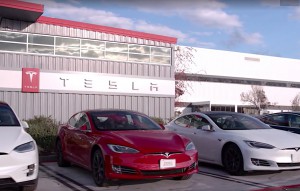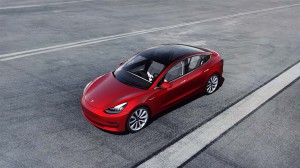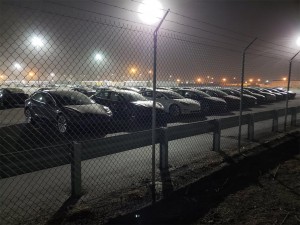
Tesla shareholders aren't entirely thrilled with the company's 2018 results and the stock price reflects it.
Tesla’s New Year is off to a shaky start, investors driving down its stock price while fretting about the company’s unexpectedly weak fourth-quarter sales and the potential hit the carmaker will take in 2019 as it watches its federal tax incentives phase out.
It wasn’t all bad news. Tesla’s total 2018 sales nearly matched what the company had delivered in all previous years combined, and after suffering through what CEO Elon Musk had once described as “production hell,” the Tesla assembly plant in Fremont, California, appears to be humming along. But deliveries during the final three months of 2018 fell about 1.5% below analysts’ expectations. And now, Tesla has to worry about what will happen as the $7,500 tax credits offered by the federal government begins to phase out.
“We are taking steps to partially absorb the reduction of the federal EV tax credit (which, as of Jan. 1, dropped from $7,500 to $3,750),” Tesla said in a statement, adding that, “Starting today, we are reducing the price of Model S, Model X and Model 3 vehicles in the U.S. by $2,000.”
The federal tax credits for battery-based automobiles have a cap of 200,000 vehicles. Once a manufacturer reaches that point they are trimmed by half, as Tesla noted, for six months. Come July 1, Tesla’s incentives will be reduced again by half, to $1,875, before being eliminated entirely on Jan. 1, 2020.
(Tesla pushing midnight sales to clear backlog of Model 3s. Click Here for the story.)

Electric vehicle sales were up nearly 300% in California, but that wasn't enough to push Tesla sales to meet analysts' expectations for 2018.
Tesla is the first automaker to reach the EV cap, though General Motors will see its own incentives cut this year, with Nissan expected to follow some months later. The loss of those credits could pose a potentially serious problem for the manufacturers, especially as a number of key competitors are just getting ready to roll out their own, long-range electric vehicles. These include brands such as Audi, Ford, Mercedes-Benz and Volkswagen. Hyundai and sibling Kia ended 2018 with the launch of several well-reviewed extended-range models, as well.
Tesla remains the best-selling maker of EVs, and it clearly gained traction in 2018 after suffering through serious production problems the year before. The automaker says it is now steadily rolling out about 1,000 vehicles a day, or about 6,000 a week on a six-day schedule. It has said it will eventually make additional investments that could bring output at the Fremont plant to 10,000 a week, but the specific timing is uncertain. So is the potential market needed to justify such a move.
On the plus side, 2018 saw Tesla more than double its previous annual sales record, the carmaker delivering more than 245,000 of its various models worldwide – the vast majority of those being the new Model 3 sedan. And at 90,700, fourth-quarter deliveries were up by 8% over those of the third quarter. Still, that fell short of expectations, data service FactSet reporting that the Wall Street consensus was closer to 90,000 for the most recent period.
(Click Here for more about Tesla hustling to build new plant in China.)
The bigger question is what happens now that the federal tax credits are being phased out at a time when competition is rapidly heating up.

Dozens of Tesla Model 3 sedans were reportedly being held in this Union Pacific freight depot in Salt Lake City.
Tesla has taken several steps to broaden the potential appeal of the Model 3, in October announcing a lower-priced version that, it claimed, could cost an owner as little as $31,000. But the figures were misleading, according to critics, as they factored in not only the full federal tax credits but California credits and even potential energy cost savings compared to a gas-powered vehicle. Exclude those and the price worked out to around $45,000.
Even with the latest price cuts announced today Tesla still isn’t offering the $35,000 version of the Model 3 promised when the electric sedan went into production in July 2017. Musk has said it is coming but has yet to reach showrooms.
(Tesla has a smelly Easter egg in its latest infotainment system – a fart app. Click Here for more.)
How things will play out for Tesla in the New Year is far from certain, but there is clear concern among investors who have been hammering the company’s share price since mid-December, even before the broader stock market sell-off began ahead of the Christmas-New Year’s holiday. After peaking at $376.79 on Dec. 13, TSLA stock bottomed out at $295.39 during the short trading day on Christmas Eve. It rebounded to $332.80 on New Year’s Eve, but is today running below $310, off as much as 8% in morning trading.
